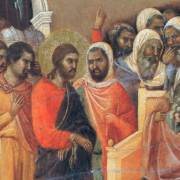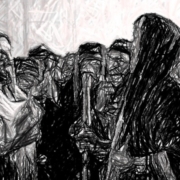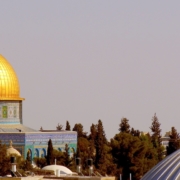The Jihad of Jesus (Part 2): Jihad as Nonviolent Struggle
Dave Andrews | Monday, 4 May 2015
This series of articles is based on Dave's upcoming book release, The Jihad of Jesus, which is being published by Wipf & Stock. Read Part 1 of this series.
Maulana Wahiduddin Khan says, “God is Peace”. He says “the very word Islam (from the Arabic silm) means peace.” So, “according to the Prophet, peace is a prerequisite of Islam”. He says “a Muslim is one from whose hands people are safe”.[i] And this could be true, for all Muslims and Christians and Jews, if all Muslims and Christians and Jews would only allow ourselves to be born again in the spirit of the Bismillah.
The Bismillah stands for the Arabic phrase Bismillah ir-Rahman ir-Rahim, commonly translated, "In the name of God, most Gracious, most Compassionate". According to Ibn Qayyum, rahman describes the quality of limitless grace with which God embraces the whole of the world and all of those who dwell in it, while rahim describes the general embracing grace of God as it interacts with us in the particular circumstances of our lives, always proactive, always prevenient, always responsive.[ii]
In the light of the Bismillah, Abdul Ghaffar Khan says, we need to remember that if we do have conflict with one another, the ‘weapon of the Prophet’ we should use is sabr or ‘patience’. “If you exercise patience, victory will be yours. No power on earth can stand against it.” He says we need to be mindful that the Qur’an says, “there is no compulsion in religion”; “forgive and be indulgent”; “render not vain your almsgiving by injury;” “whoso-ever kills one — for other than manslaughter — it shall be as if he had killed all mankind, and whoso saves the life of one, it shall be as if he had saved the life of all mankind.”[iii]
This is completely contrary to the extremist’s idea that for Muslims to be ‘true’ Muslims they need to conduct a jihad, characterised as a ‘resolute, offensive, violent struggle’[iv] by ‘suicide bombing’[v] to eliminate everything non-Muslim from society.[vi]
In his classic book Reconstructing Jihad Amid Competing International Norms, Halim Rane argues we need to wrest the concept of jihad from the control of the extremists and deconstruct and reconstruct our interpretation of jihad in the light of the Qur’an. Rane says if we are to interpret the Qur’an correctly, each verse needs to be interpreted in terms of the text, the language, the meaning it had for the people at the time it was written, and the meaning it has for people reading it in today’s world, in the light of the Bismillah, in the context of the maqasid or ‘overall general objective’ of Islam.[vii]
Quoting Kamali, Rane says the ‘overall general objective’ of Islam is based “in textual injunctions of the Qur’an and the Sunnah” which, he says, are focused on “wisdom, mercy, justice and equity” and directed to “the benefit of mankind”, which, he says, includes “welfare, freedom, dignity and fraternity”.[viii]
One verse which needs to be carefully (re)interpreted in terms of the text, the language, the meaning it had for the people at the time it was written, and the meaning it has for people reading it in today’s world, in the light of the Bismillah, in the context of the ‘general objective’ of ‘wisdom, mercy, justice and equity’ of Islam, is the (in)famous ‘sword verse’ which instructs Muslims to ‘slay’ Christians: ordering them “to slay those who ascribe divinity to aught but God, wherever you may come upon them”, (9:5).[ix]
Rane says “this verse along with Quran 9:29 (which says ‘fight those from among the People of the Book who believe neither in God, nor in the Last Day, nor hold as unlawful what God and his Messenger have declared to be unlawful, nor follow the true religion, until they… agree to submit’) has been quoted throughout Muslim history to justify aggression and aggressive wars against non-Muslims because of their ‘unbelief’’.” Rane says “these verses are among those most commonly quoted by al Qaeda leaders and published on the Internet for recruitment.”[x]
Asad … explains that this verse should be read in conjunction with those that precede it. [In 9:5 it says “As for those who have honoured the treaty you made with them, and have not supported anyone against you: fulfill your agreement with them to the end of their term. God loves those who are righteous.”] Of central importance is that these verses were revealed in the context of ‘warfare already in progress with people who (had) become guilty of a breach of treaty obligation and of aggression.’ … That non-Muslims are to be fought because of their unbelief rather than their act of aggression is doubtful given that [verse 9:5 continues, ‘if they repent, and take to prayer regularly and pay alms, then let them go their way. God is forgiving and merciful,’ and] verse 9:6 commands the Muslims to give protection and security to those among the enemy who seek it. If their unbelief was the basis of fighting against them, this provision would be nonsensical.[xi]
Rane says, “In the context of conflict, the pursuit of peace is paramount to the extent that the Qur’an instructs Muslims; ‘Do not allow your oaths in the name of God to become an obstacle to virtue and God-consciousness and the promotion of peace between people’ (2: 224) … peace should not be rejected, even from a non-Muslim encountered in war (4:94).”[xii]
Rane insists peace not war is the purpose of Islam, and jihad is the path to peace. Rane asserts that in the Qur’an the word for ‘war’ is not jihad but qital, and that the word jihad means ‘struggle’ not ‘war’. He says that there 6,000 verses in the Qur’an, and out of those 6,000 verses, only 35 verses refer to jihad; and out of those 35 verses, 20 times jihad is used ambiguously, 11 times jihad is used unambiguously in terms of peace, and 4 times jihad is used unambiguously in terms of war.[xiii]
Where the word jihad is used ambiguously or unambiguously in the context of war, Rane says, the Qur’an imposes strict ‘rules of engagement’ to temper the use of violence with “wisdom, mercy, justice and equity” in the hope of minimizing “force, suffering, ignominy and enmity” and maximizing “welfare, freedom, dignity and fraternity”. Rane says that according to the Qur’an, the conduct of jihad in war would need to take eight ‘rules for engagement’ into account.
- Killing — except in self-defense — is considered a grievous sin.[xiv]
- War is only permitted for self-defense and self-determination.[xv]
- All wars of aggression are forbidden.[xvi]
- If you are not specifically attacked by enemies you should not to attack them, even if they are your enemies.[xvii]
- Muslims should never, ever use difference of religion with non-Muslims as an excuse for a war of aggression.[xviii]
- In war, Muslims should protect all places of worship, not only mosques, but also churches and synagogues.[xix]
- In war, Muslims should protect “helpless men, women and children”,[xx] “even the accidental harm of the innocent is a ‘grievous wrong’ for which those responsible are ‘guilty’.”[xxi]
- If peace is offered by your attacker, it should not be rejected, even if the sincerity of the offer is dubious, as God always wants his people to ‘give peace a chance’.[xxii]
Similarly, in Christianity, Ambrose and Augustine developed a set of criteria to call those in power — who make war — to temper the use of violence with ‘wisdom, mercy, justice and equity’. They argued that in order for a war to be conducted according to the principles of justice it would need to meet eight specific conditions.
- It would need to be motivated by a ‘just’ cause — and the only cause considered to be ‘just’ was to stop the killing of large numbers of people.
- It would need to be administered by a ‘just’ authority — duly constituted authorities had to proceed carefully according to due process before taking action.
- It would always need to be a last resort — after all means of negotiation, mediation, arbitration and nonviolent sanctions had been exhausted.
- It would need to be for a ‘just’ purpose — to secure the welfare, safety and security of all parties in the dispute, including the enemy.
- It would need to be a reasonable risk — not a futile gesture, but a realistic venture, with a reasonable hope of success.
- It would need to be cost effective — the outcomes of victory would outweigh the human costs of battle.
- That any government intending to go to war should announce their intentions, articulating the conditions that would need to be met to avert it, in order to avoid going to war if at all possible.
- That, if the war were to go ahead, that not only the ends, but also the means would need to be ‘just’ — noncombatants must be protected; once combatants surrender, they too must be protected from slaughter; and all prisoners must be protected from torture.
According to these criteria, none of our current wars are ‘just wars’, they are just ‘wars’.
If we are to struggle for justice with integrity, dignity and grace we need to reject all the calls to a violent jihad of Not-So-Holy so-called ‘Holy Wars’ and embrace the nonviolent jihad of the whole-hearted strong-but-gentle struggle for justice against injustice.
Qader Muheideen says “the purpose of jihad ultimately is to put an end to ‘structural violence’,”[xxiii] and we must choose means consistent with that end. Muheideen says for jihadists to end violence we have to choose nonviolent means.[xxiv] He says there are eight cogent Islamic reasons to reframe jihad as a nonviolent struggle:
- For Islam, the problem of violence is an integral part of the Islamic moral sphere.
- Any violence used must be governed by the ‘rules of engagement’ in the Qur’an.
- If any violence used in modern warfare and/or terror campaigns cannot discriminate between combatants and noncombatants, it is quite unacceptable to Islam.
- Modern technologies of destruction used in modern warfare and/or terror campaigns, like drones and bombs, render discrimination virtually impossible.
- So in the modern world, fighting today’s battles, Muslims cannot use violence.
- Islam teaches Muslims to fight for justice against injustice in the light of the truth that human lives are genuinely sacred and taking human lives is a grievous sin.
- In order to be true to Islam, Muslims must use nonviolent strategies and tactics in the struggle, such as submission to the will of Allah and civil disobedience.
- Islam is a strong resource for a nonviolent struggle because of its tradition of personal discipline, social responsibility, robust perseverance and self-sacrifice.[xxv]
Added to these philosophical/theological reasons are two practical/historical reasons:
- The use of nonviolent means is more likely to bring about nonviolent ends, like a democratic society with accountable administration and unarmed opposition.[xxvi]
- And the use of nonviolent means and ends are more likely to get the support and approval of the international community ‘amid competing international norms’.[xxvii]
[i] Maulana Wahiduddin Khan, The Prophet of Peace (New Delhi: Penguin, 2009), xi.
[ii] Bismillah al rahman al Rahim, http://wahiduddin.net/words/bismillah.htm.
[iii] Eknath Easwaren, A Man To Match His Mountains (Petuluma: Nilgiri Press, 1984), 117, 209.
[iv] Sayyid Qutb, Milestones (Chicago: Kazi Publications, 2003), 63–9.
[v] http://www.rrg.sg/index.php?option=com_content&view=article&id=15%3Aour-message&catid=2%3Aour-message&Itemid=6&limitstart=2
[vi] Qutb, Milestones, 130, 134.
[vii] Halim Rane, Reconstructing Jihad Amid Competing International Norms (New York: Palgrave Macmillan, 2009), 165.
[viii] Rane, Reconstructing Jihad, 168–170.
[ix] Rane, Reconstructing Jihad, 186.
[x] Rane, Reconstructing Jihad, 186.
[xi] Rane, Reconstructing Jihad, 186–7.
[xii] Rane, Reconstructing Jihad, 193.
[xiii] Rane, Reconstructing Jihad, 141–2.
[xiv] Rane, Reconstructing Jihad, 178.
[xv] Rane, Reconstructing Jihad, 178.
[xvi] Rane, Reconstructing Jihad, 181.
[xvii] Rane, Reconstructing Jihad, 190.
[xviii] Rane, Reconstructing Jihad, 184.
[xix] Rane, Reconstructing Jihad, 179.
[xx] Rane, Reconstructing Jihad, 183.
[xxi] Rane, Reconstructing Jihad, 189.
[xxii] Rane, Reconstructing Jihad, 193.
[xxiii] Chaiwat Satha-Anand (Qader Muheideen), “The Nonviolent Crescent” in Islam And Nonviolence (ed. Glenn Paige, Chaiwat Satha-Anand and Sarah Gilliatt; Honolulu: Center For Global Nonviolence Planning Project, 1993), 10.
[xxiv] Satha-Anand (Muheideen) “The Nonviolent Crescent,” 11.
[xxv] Satha-Anand (Muheideen) “The Nonviolent Crescent,” 23.
[xxvi] Erica Chenoweth and Maria J. Stephan, Why Civil Resistance Works: The Strategic Logic of Nonviolent Conflict (Columbia Studies in Terrorism and Irregular Warfare; New York: Columbia University Press, 2011).
[xxvii] Rane, Reconstructing Jihad, 114–126.
Dave Andrews and his wife Ange have lived and worked in intentional communities with marginalised groups of people in Australia, Afghanistan and India for forty years. Dave is a founder of the Waiters Union; an educator for TEAR Australia; a teacher at Christian Heritage College; an elder emeritus for Servants To Asia’s Urban Poor; and a member of AMARAH (Australian Muslim Advocates for the Rights of All Humanity).












Trackbacks & Pingbacks
[…] The Jihad of Jesus (Part 2): Jihad as Nonviolent Struggle […]
[…] The Jihad of Jesus (Part 2): Jihad as Nonviolent Struggle […]
Comments are closed.